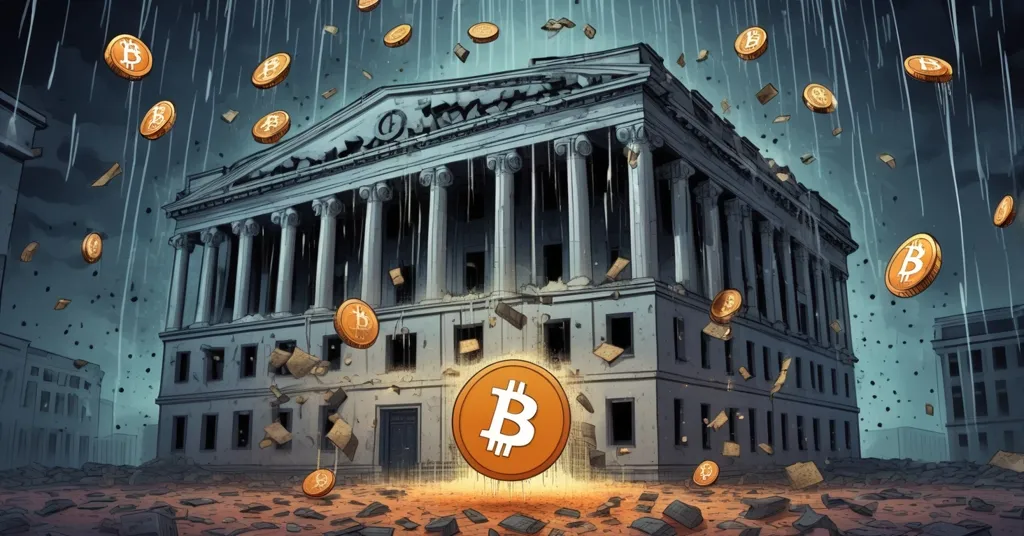Czech Government Survives $45M Bitcoin Scandal as Trust and Ethics Crumble

Czech Government Clings to Power Amid $45M Bitcoin Donation Fiasco
The Czech Republic is embroiled in a political firestorm over a $45 million Bitcoin donation from a convicted darknet market operator, with Prime Minister Petr Fiala’s government barely surviving a no-confidence vote. This scandal, centered on 480 BTC accepted by the Ministry of Justice, lays bare the chaotic intersection of cryptocurrency, governance, and ethics, as investigations ramp up and elections loom.
- Narrow Escape: Czech government survives no-confidence vote, 98-94.
- Crypto Debacle: $45M Bitcoin donation from darknet criminal ignites outrage.
- Political Damage: Justice Minister resigns, public trust and ruling party suffer.
The $45M Bitcoin Blunder: A Darknet Disaster
Picture this: a government department accepts a staggering 480 BTC—valued at roughly $45 million or 1 billion Czech koruna—from Tomáš Jiřikovský, a man convicted of drug trafficking, weapons offenses, and embezzlement tied to the darknet market Nucleus Market. This isn’t a plot twist from a crime drama; it’s the real-life screw-up that has rocked the Czech Republic’s Ministry of Justice. Jiřikovský, who served time until 2021, offered around 1,561 BTC as a supposed act of “penance,” but only a third was accepted. That decision, made without verifying the funds’ origins, led to the resignation of Justice Minister Pavel Blažek in May, who called it a “mistake” and “ethically problematic” while denying corruption. Yet, the stench of incompetence lingers, and the public isn’t buying the excuses, as seen in heated online discussions about the controversy.
For those new to the space, Bitcoin (BTC) is a decentralized digital currency running on a blockchain—a public, unalterable ledger of every transaction. It’s often praised as the future of money for cutting out middlemen like banks, but its pseudo-anonymity has made it a go-to for illicit dealings on darknet markets. These hidden online platforms, accessible only via tools like Tor, trade everything from drugs to hacked data, often using Bitcoin as currency. Jiřikovský’s Nucleus Market was one such hub, and his crypto stash reflects profits from that underworld. Interestingly, a tech expert, Jiří Berger, who witnessed the opening of Jiřikovský’s wallet, revealed that a larger chunk—3,855.15 BTC—remains locked away due to outdated tech, like obsolete software or lost access keys. It’s a digital safe with a forgotten combo, a stark reminder that Bitcoin’s security can be a double-edged sword. For more on Jiřikovský’s background, check out community insights into his darknet connections.
Political Fallout in Prague: A Coalition on Thin Ice
The political fallout from this Bitcoin trainwreck couldn’t have come at a worse time for Prime Minister Petr Fiala and his Civic Democrats (ODS) party. The ruling coalition—a mix of center-right groups including ODS, STAN (Mayors and Independents), KDU-ČSL (Christian Democrats), and TOP 09—narrowly fended off a no-confidence vote in the Chamber of Deputies, scraping by with 98 votes against to 94 in favor among 192 members present. Fiala downplayed the close call, stating dryly:
“We have just had another vote of no-confidence in the government. It went as expected and the government survived the vote.”
But let’s not pretend this is business as usual. This is the fourth no-confidence motion in three years for Fiala’s government, and the Bitcoin fiasco has dealt a brutal blow to public trust in state institutions. Polls already show the opposition ANO party, led by former Prime Minister Andrej Babiš, commanding 31.2% support compared to the coalition’s 21.6%. With parliamentary elections set for October, this blunder could be the knockout punch. For deeper analysis on the vote’s outcome, see this detailed breakdown of Fiala’s government challenges.
The ANO party, a right-wing populist force, didn’t miss their chance to twist the knife. Babiš accused ODS of being a “criminal organization” and branded Fiala as “the head of the mafia,” while demanding the resignation of Finance Minister Zbyněk Stanjura for failing to flag the suspicious donation to the Financial Analytical Office or convene the National Security Council. Stanjura denies any direct role in the mess, but the opposition’s narrative—that this government can’t be trusted to handle a multi-million-dollar crypto gift without tripping over itself—has gained traction. Even within the coalition, cracks are visible. STAN publicly criticized the handling of the scandal but ultimately backed Fiala, a begrudging loyalty that signals deeper tensions. More on the unfolding political drama can be found in this report on the ongoing probe.
Crypto’s Governance Curse: A Global Problem
Beyond the political circus in Prague, this debacle exposes a raw nerve in the relationship between cryptocurrency and governance. Bitcoin’s decentralized nature is its superpower—nobody controls it, and transactions are transparent on the blockchain. But when a government accepts millions in BTC from a darknet kingpin without a shred of due diligence, it’s not just incompetence; it’s a neon sign flashing “we’re clueless about crypto.” How does a state body not double-check the source of funds tied to a convicted criminal? That’s the question burning through the Czech Republic, and Fiala himself admitted it’s a “preventable” disaster that’s eroded public confidence. Learn more about the broader impact of crypto scandals on trust in governance.
New Justice Minister Eva Decroix, stepping into Blažek’s radioactive post, has promised an independent audit and a thorough investigation into who authorized the transfer and why basic checks were ignored. That’s a start, but let’s not hold our breath—governments botching crypto isn’t a Czech exclusive. Look at El Salvador, where Bitcoin was made legal tender in 2021, only to face wallet glitches and public skepticism that tanked trust in the rollout. Or India, where regulatory flip-flops on crypto have left businesses and investors in limbo. The Czech Republic is just the latest to get burned by trying to play in a sandbox it doesn’t understand. And frankly, if you can’t handle Bitcoin without stepping on a rake, maybe stick to fiat. For context on Blažek’s exit, see this explanation of his resignation.
Playing Devil’s Advocate: Was There Any Logic Here?
Let’s take a step back and play devil’s advocate for a hot second. Could there have been any justification for accepting Jiřikovský’s donation? Some might argue it was a form of restitution—a criminal paying back society with ill-gotten gains. Budget-strapped governments might see millions in BTC as a windfall, especially if they believe they can clean the funds through legal channels. Even Blažek framed it as “penance” before the backlash hit. But here’s the brutal reality: accepting tainted crypto without ironclad verification isn’t noble; it’s reckless. You’re not just risking public trust—you’re potentially laundering dirty money through state coffers. And in Jiřikovský’s case, with thousands of BTC still out there, who’s to say this wasn’t a PR stunt or a way to offload traceable funds? No dice. Ethical governance demands better. Dive into more details with this comprehensive overview of the scandal.
Bitcoin’s Dark Side and Technical Traps
This mess also shines a harsh light on Bitcoin’s darker associations and technical quirks. Darknet markets like Nucleus have historically fueled Bitcoin’s early growth, with BTC serving as the currency of choice for anonymous deals. Law enforcement struggles to track or seize these funds—Jiřikovský’s case shows how criminals can amass fortunes in crypto, even post-conviction. Yet, the flip side is the risk of loss. That inaccessible stash of 3,855.15 BTC Berger mentioned? It’s likely tied to lost private keys or outdated wallet software, a common pitfall in crypto. Think of it as locking a vault and throwing away the key—millions gone forever, no matter who owns it. Early Bitcoin miners have lost fortunes this way, and it’s a lesson for anyone, including governments holding seized crypto: secure storage isn’t optional. For newcomers, this means backing up your seed phrases (those recovery words for your wallet) like your life depends on it.
Could this technical trap become a bigger issue for states dabbling in crypto? Absolutely. Governments seizing or accepting Bitcoin without the know-how to manage it risk losing assets or, worse, exposing themselves to hacks. The Czech Republic dodged that bullet with Jiřikovský’s locked funds, but it’s a warning shot. Decentralized tech doesn’t care about your bureaucracy—if you fumble the keys, you’re done.
Decentralization as a Fix: A Pipe Dream or Reality?
Zooming out, this fiasco begs a bigger question: could blockchain technology itself prevent such governance failures? Bitcoin’s public ledger ensures transparency—every transaction is visible to anyone with an internet connection. Imagine a system where government donations or public funds are tracked on a blockchain, accessible for all to audit in real-time. Ethereum-based projects already experiment with this for charity donations, using smart contracts (self-executing code) to automate and verify transfers. Bitcoin’s simplicity lacks that flair, but its raw transparency could still force accountability if governments had the guts to adopt it.
Of course, there are hurdles. Privacy concerns, technical literacy, and political will are massive barriers—most officials can’t spell “blockchain,” let alone implement it. And let’s not romanticize decentralization as a cure-all; corrupt actors can still game transparent systems if oversight lags. Still, as a Bitcoin maximalist, I’d argue BTC’s neutrality and immutability make it a better fit for state-level transparency than any centralized database prone to tampering. Altcoins like Ethereum fill niches with complex tools, but Bitcoin’s “keep it simple” ethos might be the safer bet for governments—if they ever get their act together.
What’s Next for the Czech Crypto Catastrophe?
For now, the Czech government has dodged the no-confidence bullet, but the $45 million Bitcoin debacle is far from over. Investigations under Decroix could unearth more dirt—or exonerate key players. With elections in October, voter sentiment might hinge on whether this scandal is seen as a one-off blunder or systemic rot. From a crypto lens, it’s a glaring reminder that decentralized assets are political dynamite. Governments worldwide are watching, and they’d better learn fast: Bitcoin isn’t just a financial revolution; it’s a test of competence. Fail it, and the fallout isn’t just votes—it’s the trust of an entire generation betting on a freer, more transparent future. Stay updated with the latest developments in this detailed investigation update.
Key Takeaways and Questions on the Czech Bitcoin Scandal
- What sparked the no-confidence vote in the Czech Republic?
A $45 million Bitcoin donation from convicted darknet operator Tomáš Jiřikovský, accepted by the Ministry of Justice without verification, triggered public outrage and political backlash leading to the vote. - Why did Justice Minister Pavel Blažek resign?
Blažek stepped down in May after admitting that accepting the unverified crypto donation was a mistake and ethically problematic, hoping to limit damage to the government’s reputation. - How does this Bitcoin scandal affect public trust in governance?
It has severely undermined confidence in Czech state institutions, exposing gaps in competence and ethics when handling decentralized assets like Bitcoin, and fueling distrust ahead of key elections. - What steps are being taken to address this cryptocurrency controversy?
New Justice Minister Eva Decroix has committed to an independent audit and detailed investigation into the donation’s handling and the decision-making process behind its acceptance. - Can blockchain technology prevent future governance failures with crypto?
Potentially, as public ledgers like Bitcoin’s blockchain could ensure transparency for government funds or donations, though technical and political barriers make widespread adoption a steep challenge. - What broader lessons does this offer for Bitcoin and politics?
It highlights the urgent need for robust policies on crypto in governance, showing that Bitcoin’s decentralized nature can be a political liability if mishandled, risking both trust and credibility on a global stage.


